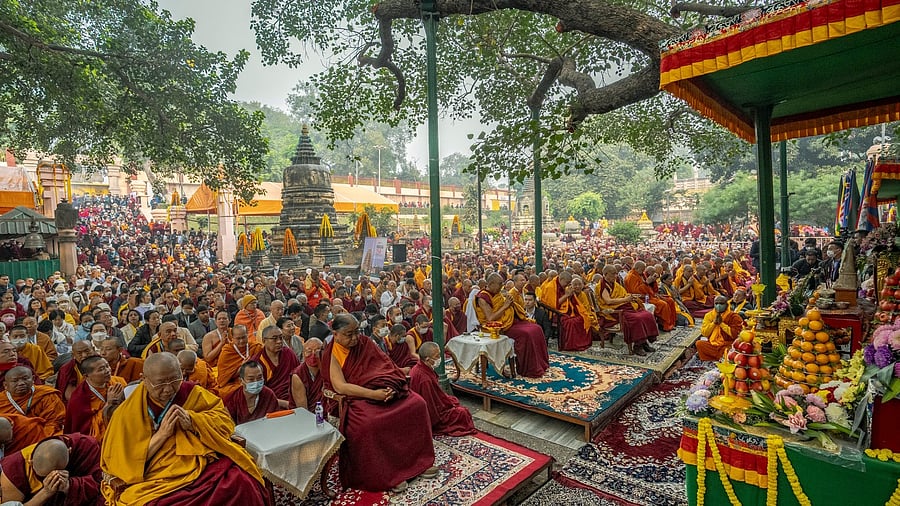
Monks gather for prayer under the Bodhi tree at the Mahabodhi Temple, site of Buddha's enlightement in Bihar
Credit: X/@DalaiLama
Bodh Gaya in Bihar is seeing Buddhists from across India gather to protest over the control of a shrine there, which is partly managed by Hindus, demanding that it be handed over exclusively to them.
Akash Lama, general secretary of the All India Buddhist Forum (AIBF) -- the collective leading the campaign -- told Al Jazeera that several Buddhist organisations had held rallies from Ladakh in the north to Mumbai in the west, and Mysuru in south. India has 84 lakh Buddhist citizens, as per the last census in 2011.
Bodh Gaya’s Mahabodhi Temple -- which is at the centre of the row -- has been managed by an eight-member committee, made up of Hindus and Buddhists, for the last 76 years.
There are four Hindus and four Buddhists on the panel, as per the Bodh Gaya Temple Act, 1949, the publication reported.
Buddhist protesters are now demanding the Act be repealed, and the temple completely handed over to Buddhists. Their argument is that in recent years, Hindu monks have increasingly performed Vedic rituals defying the spirit of Buddhism.
The Bodh Gaya Math -- the Hindu monastery performing said rituals -- said that it has played a central role in the upkeep of the shrine for centuries and the law is on its side, the publication added.
Protesters, meanwhile, pointed out how Buddha was opposed to Vedic rituals. One noted that all religions in India 'take care and manage their own religious sites' demanding that this be extended to Buddhists as well.
In 2012, two monks had filed a petition before the Supreme Court seeking a repeal of the 1949 law which gives Hindus a say in the running of the shrine.
It is now 2025, and the matter has not been listed for hearing, the publication noted, adding that in recent months, monks have again submitted memorandums to the state and central governments, besides taking out rallies.
On February 27, reportedly, two dozen Buddhist monks who were sitting on a hunger strike for 14 days in the temple premises, were removed at midnight by the Bihar police and forced to relocate outside the temple.
History of the Mahabodhi Temple and the Hindu-Buddhist claims
The Mahabodhi Temple, built by Emperor Ashoka, is now a UNESCO World Heritage Site. Ashoka built the temple in 260 BCE after embracing Buddhism. Reportedly, it remained under Buddhist management for years, until major political changes there in the 13th century, a medieval history professor at the Patna University told the publication.
As per UNESCO, the shrine was mostly abandoned between the 13th and 18th centuries till the British started renovations. However, as per the shrine's site, a Hindu monk turned up there in 1590 and started living there. He formed the Bodh Gaya Math, a Hindu monastery, and the temple has been controlled by descendants of Giri.
In the late 19th century, Sri Lankan and Japanese Buddhist monks who were visiting, founded the Maha Bodhi Society to lead a movement to reclaim this site. Then, in 1903, Lord Curzon tried negotiating a deal between Hindu and Buddhist sides, but failed. Two years after India's independence in 1947, the Bihar govt pushed through the Act.
While there are equal number of members in the committee, Buddhists allege it is the Hindu-run Bodh Gaya Math which runs the day-to-day workings of the complex.
There are contesting claims of ownership as well. Swami Vivekananda Giri, who looks after the Bodh Gaya Math, told Al Jazeera that Hindus owned the temple before the Act and India's independence. He categorised the protests as 'politically motivated', noting it comes ahead of the Bihar assembly elections, slated to be held later this year.
Giri also said, "When the Buddhists abandoned it after the invasion of Muslim rulers, we preserved and took care of the temple. Yet we never treated Buddhist visitors as ‘others’."
A Buddhist protester meanwhile said "The rights of Buddhists are being gradually violated by using the Act. Buddhists have the right over the temple, so it should be handed over to the Buddhists. We have been disappointed in the government and the Supreme Court [for failing to hear the case]."
